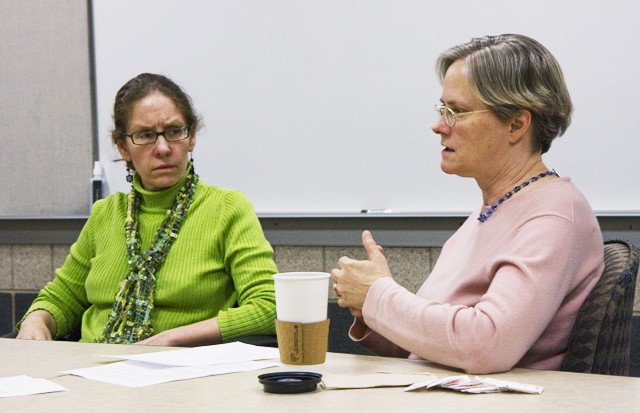A class of University of Minnesota graduate students is teaming up with the Hennepin County Housing First Program in an effort to end long-term homelessness in the county by 2016. In spring 2009, associate professor Maria HanrattyâÄôs interests in poverty lead her to fuse her capstone project course for the masterâÄôs program in the Humphrey Institute of Public Affairs with the Housing First Program. The students focused on data analysis of the homeless community in Hennepin County. This semester, the project will continue where it left off last year. âÄúWeâÄôre looking more at which people are receiving services and figuring out who are the actual long-term homeless and looking at the need based on the definition of homelessness,âÄù Hanratty said. The Office to End Homelessness in Minneapolis and Hennepin County met in 2006 to discuss a plan-of-action. This commission was made up of 70 community leaders, including Mayor R.T. Rybak and other leaders from businesses, faith communities and service providers. This commission created a 10-year plan, âÄúHeading Home Hennepin,âÄù to end long-term homelessness by 2016. âÄúThis is a major effort,âÄù said Cathy ten Broeke, the program coordinator. âÄúWe are trying to change the paradigm of managing homelessness to ending it.âÄù A major part of this plan is to provide those who are homeless with permanent housing. A branch of Heading Home Hennepin that focuses on this effort is the Housing First Program. The program provides homeless people in the county with permanent housing opportunities and also sets them up with various education and employment services to help them maintain permanent housing. âÄúWeâÄôre making a lot of progress, especially considering where the economy has taken us,âÄù said Matthew Ayres, project manager for Heading Home Hennepin. âÄúIf we didnâÄôt have this plan, we would be much worse off. We havenâÄôt had to face major increases in homelessness like other parts of the country.âÄù HanrattyâÄôs capstone project meets as a class one time per week, but the bulk of the work takes place outside of the classroom. âÄúWeâÄôll schedule the interviews with the homeless provider clients or with those in the homeless shelters,âÄù said Ashley Edwards, a public policy graduate student, who is currently enrolled in HanrattyâÄôs capstone project. âÄúWeâÄôll use class to report info to one another and to strategize.âÄù The students will analyze the data provided by Hennepin County and then interview participants in the program to evaluate the progress and success. âÄúThe challenging part is understanding what kind of information the client needs and how theyâÄôre going to use it,âÄù Edwards said. âÄúTaking time to see what they need is important because it gives you direction for the entire semester.âÄù Hanratty said she is eager to partner with the Housing First Program again because of what both parties are able to take out of the experience. âÄúItâÄôs gratifying to see my students seem to really enjoy the project,âÄù Hanratty said. âÄúThey felt like they had done something meaningful and were really happy with what they had done.âÄù

Image by Aleutian Calabay
Associate Professor at Humphrey Institute Maria Hanratty, left, and Hennepin County’s Office to End Homelessness representative Lisa Thornquist, right, spoke to a group of graduate students Wednesday at Carlson School of Management.
Students work to end homelessness
Grad students are partnering with Hennepin County to combat the issue.
by Andrea Schug
Published January 28, 2010
0

